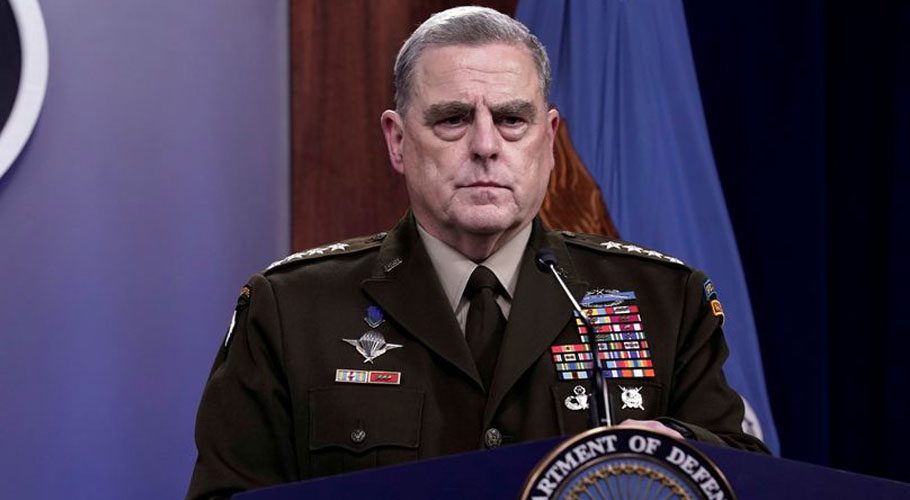WASHINGTON: The top US general conceded in a stark admission that the United States “lost” the 20-year war in Afghanistan.
“It is clear, it is obvious to all of us, that the war in Afghanistan did not end on the terms we wanted, with the Taliban in power in Kabul,” General Mark Milley, chairman of the US Joint Chiefs of Staff, told the House Armed Services Committee.
“The war was a strategic failure,” Milley told a committee hearing about the US troop pullout from Afghanistan and the chaotic evacuation from the capital Kabul. It wasn’t lost in the last 20 days or even 20 months,” Milley said.
“There’s a cumulative effect to a series of strategic decisions that go way back,” said the general, the top military advisor to President Joe Biden, who ordered an end to the 20-year US troop presence in Afghanistan”.
“Whenever you get some phenomenon like a war that is lost — and it has been, in the sense of we accomplished our strategic task of protecting America against Al-Qaeda, but certainly the end state is a whole lot different than what we wanted,” Milley said. “So whenever a phenomenon like that happens, there’s an awful lot of causal factors,” he said. “And we’re going to have to figure that out. A lot of lessons learned here.”
Milley listed a number of factors responsible for the US defeat going back to a missed opportunity to capture or kill Al-Qaeda leader Osama bin Laden at Tora Bora soon after the 2001 US invasion of Afghanistan.
He also cited the 2003 decision to invade Iraq, which shifted US troops away from Afghanistan, “not effectively dealing with Pakistan as a (Taliban) sanctuary,” and pulling advisers out of Afghanistan a few years ago.
Biden, in April, ordered a complete pullout of US forces from Afghanistan by August 31, following through on an agreement reached with the Taliban by former president Donald Trump.
Milley and General Kenneth McKenzie, commander of US Central Command, told a Senate committee on Tuesday that they had personally recommended that some 2,500 troops remain on the ground in Afghanistan.
White House press secretary Jen Psaki said Biden had received “split” advice about what to do in Afghanistan, which the United States invaded following the September 11, 2001 Al-Qaeda attacks on New York and Washington. “Ultimately, it’s up to the commander-in-chief to make a decision,” Psaki said. “He made a decision that it was time to end a 20-year war.”
Unmitigated disaster
Republican US lawmakers tried to pick apart President Joe Biden’s defense of his withdrawal from Afghanistan as they attacked his judgment and honesty during a second day of contentious Congressional hearings with Pentagon leaders.
Republicans have accused him of lying about military commanders’ recommendations to keep 2,500 troops in the country, playing down warnings of the risks of a Taliban victory, and exaggerating America’s ability to prevent Afghanistan from again becoming a safe haven for militant groups like al Qaeda.
“I fear the president may be delusional,” said Mike Rogers, the top Republican on the House of Representatives Armed Services Committee, calling the withdrawal an “unmitigated disaster.” “It will go down in history as one of the greatest failures of American leadership,” Rogers said.
General Frank McKenzie, the head of US Central Command, said both he and the top commander on the ground in Afghanistan had recommended keeping 2,500 US troops as well as thousands of more coalition forces in the country.
McKenzie, Secretary of Defense Lloyd Austin and Joint Chiefs of Staff Chairman General Mark Milley testified in the House for 4-1/2 hours on Wednesday, after spending almost all day on Tuesday at a hearing in the Senate.
McKenzie told the House committee that he had warned that a complete withdrawal would lead to the collapse of the Afghan military and the Afghan government. “That is in fact what happened,” McKenzie said. In an August television interview, Biden denied his commanders had recommended keeping 2,500 troops in Afghanistan.
Republicans have accused Biden of being untruthful, also citing his promises to leave no Americans behind and scoffing at his assurances in July that Afghanistan wouldn’t become another Vietnam even as the Taliban’s advance accelerated.
One committee member, Republican Representative Mike Johnson, used the time he had been allotted for questions to read the interview transcript aloud. Republican Joe Wilson said Biden should resign.
Other Republicans directed their anger at Milley who testified that withdrawing to zero had a major impact on morale among Afghan troops, who had grown to depend on US assistance for everything from air and intelligence support to training and equipment maintenance.
Democrats faulted Republicans for blaming Biden – who has been president since late January – for everything that went wrong during the 20 years US troops have been in Afghanistan.
Representative Adam Smith, the committee’s Democratic chairman, said he agreed with Biden’s decision to withdraw from Afghanistan. “Our larger mission to help build a government in Afghanistan that could govern effectively and defeat the Taliban had failed,” Smith said. “President Biden had the courage to finally make the decision to say no, we are not succeeding in this mission.”





































